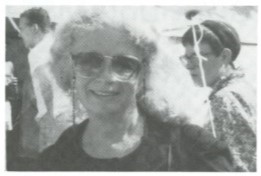

Born Lotte Reyersbach in Oldenburg, Germany in 1923, Sharley McLean arrived in England on the Kindertransport as a teenager. Both her socialist father, Franz, and Jewish mother, Grete, were killed in the Holocaust, and her gay uncle, Kurt, lost his life in Sachsenhausen concentration camp. Sharley was a nurse, activist, and humanist: a longstanding member of the Gay and Lesbian Humanist Association (now LGBT Humanists), and a driving force in the campaign to commemorate LGBT people in Remembrance Day ceremonies. She died aged 90 in 2013.
Sharley featured a number of times in the pages of LGBT Humanists’ newsletter, which were digitised in 2023.
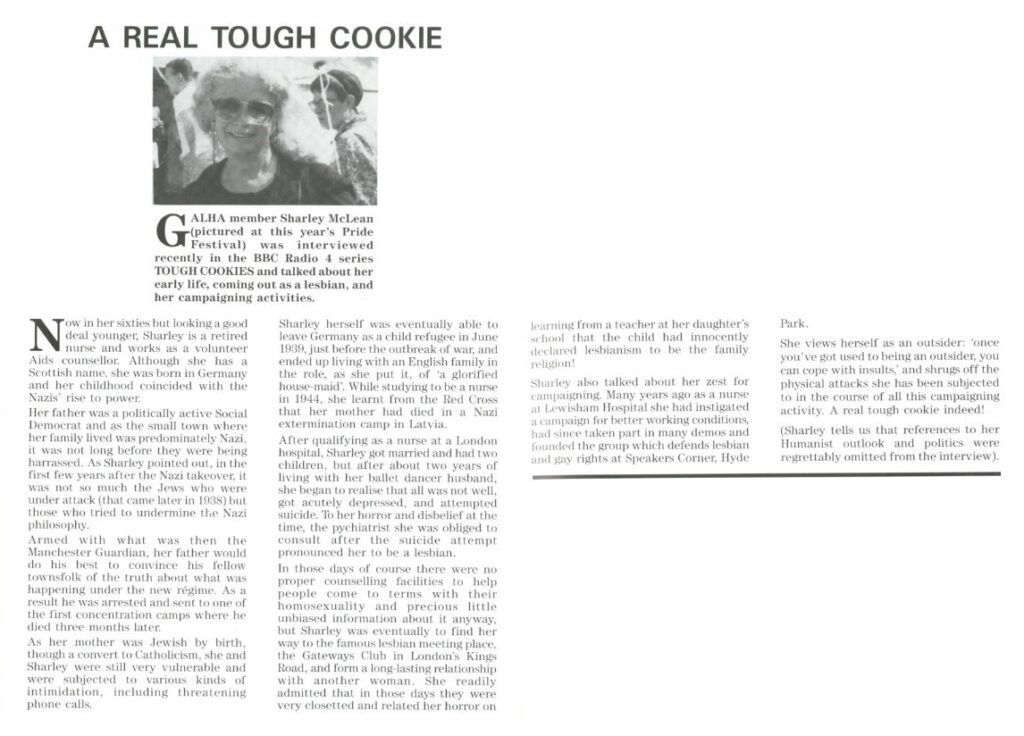
GALHA member Sharley McLean (pictured at this year’s Pride Festival) was interviewed recently in the BBC Radio 4 series TOUGH COOKIES and talked about her early life, coming out as a lesbian, and her campaigning activities.
Now in her sixties but looking a good deal younger, Sharley is a retired nurse and works as a volunteer Aids counsellor. Although she has a Scottish name, she was born in Germany and her childhood coincided with the Nazis’ rise to power. Her father was a politically active Social Democrat and as the small town where her family lived was predominately Nazi, it was not long before they were being harrassed. As Sharley pointed out, in the first few years after the Nazi takeover, it was not so much the Jews who were under attack (that came later in 1938) but those who tried to undermine the Nazi philosophy.
Armed with what was then the Manchester Guardian, her father would do his best to convince his fellow townsfolk of the truth about what was happening under the new régime. As a result he was arrested and sent to one of the first concentration camps where he died three months later.
As her mother was Jewish by birth, though a convert to Catholicism, she and Sharley were still very vulnerable and were subjected to various kinds of intimidation, including threatening phone calls.
Sharley herself was eventually able to leave Germany as a child refugee in June 1939, just before the outbreak of war, and ended up living with an English family in the role, as she put it, of ‘a glorified house-maid’). While studying to be a nurse in 1944, she learnt from the Red Cross that her mother had died in a Nazi extermination camp in Latvia.
After qualifying as a nurse at a London hospital, Sharley got married and had two children, but after about two years of living with her ballet dancer husband, she began to realise that all was not well, got acutely depressed, and attempted suicide. To her horror and disbelief at the time, the psychiatrist she was obliged to consult after the suicide attempt pronounced her to be a lesbian.
In those days of course there were no proper counselling facilities to help people come to terms with their homosexuality and precious little unbiased information about it anyway, but Sharley was eventually to find her way to the famous lesbian meeting place, the Gateways Club in’ London’s Kings Road, and form a long-lasting relationship with another woman. She readily admitted that in these days they were very closetted and related her horror on learning from a teacher at her daughter’s school that the child had innocently declared lesbianism to be the family religion!
Sharley also talked about her zest for campaigning. Many years ago as a nurse at Lewisham Hospital she had instigated campaign for better working conditions, had since taken part in many demos and founded the group which defends lesbian and and gay rights at Speakers Corner, Hyde Park.
She views herself as an outsider: ‘once you’ve got used to being an outsider, you can cope with insults, and shrugs off the physical attacks she has been subjected to in the course of all this campaigning activity. A real tough cookie indeed!
(Sharley tells us that references to her Humanist outlook and politics were regrettably omitted from the interview).
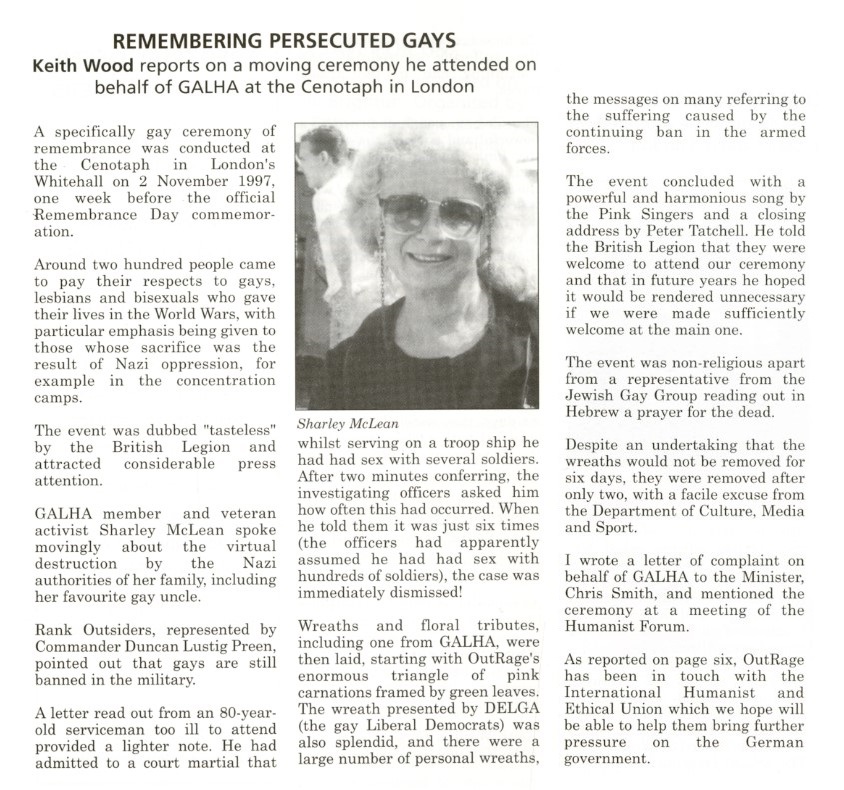
Keith Wood reports on a moving ceremony he attended on behalf of GALHA at the Cenotaph in London.
A specifically gay ceremony of remembrance was conducted at the Cenotaph in London’s Whitehall on 2 November 1997, one week before the official Remembrance Day commemoration.
Around two hundred people came to pay their respects to gays, lesbians and bisexuals who gave their lives in the World Wars, with particular emphasis being given to those whose sacrifice was the result of Nazi oppression, for example in the concentration camps.
The event was dubbed “tasteless” by the British Legion and attracted considerable press attention.
GALHA member and veteran activist Sharley McLean spoke movingly about the virtual destruction by the Nazi authorities of her family, including her favourite gay uncle.
Rank Outsiders, represented by Commander Duncan Lustig Preen, pointed out that gays are still banned in the military.
A letter read out from an 80-year-old serviceman too ill to attend provided a lighter note. He had admitted to a court martial that whilst serving on a troop ship he had had sex with several soldiers. After two minutes conferring, the investigating officers asked him how often this had occurred. When he told them it was just six times (the officers had apparently assumed he had had sex with hundreds of soldiers), the case was immediately dismissed!
Wreaths and floral tributes, including one from GALHA. were then laid, starting with OutRage’s enormous triangle of pink carnations framed by green leaves. The wreath presented by DELGA (the gay Liberal Democrats) was also splendid, and there were a large number of personal wreaths, the messages on many referring to the suffering caused by the continuing ban in the armed forces.
The event concluded with a powerful and harmonious song by the Pink Singers and a closing address by Peter Tatchell. He told the British Legion that they were welcome to attend our ceremony and that in future years he hoped it would be rendered unnecessary if we were made sufficiently welcome at the main one.
The event was non-religious apart from a representative from the Jewish Gay Group reading out in Hebrew a prayer for the dead.
Despite an undertaking that the wreaths would not be removed for six days, they were removed after only two, with a facile excuse from the Department of Culture, Media and Sport.
I wrote a letter of complaint on behalf of GALHA to the Minister, Chris Smith, and mentioned the ceremony at a meeting of the Humanist Forum.
As reported on page six, OutRage has been in touch with the International Humanist and Ethical Union which we hope will be able to help them bring further pressure on the German government.
Sharley McLean: Jewish lesbian survivor of Nazi fascism | Peter Tatchell Foundation
Sharley McLean obituary | The Guardian
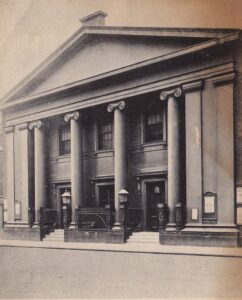
Under its successive names, adopted or given… is traceable a constant endeavour to study carefully, and keep abreast of, the […]
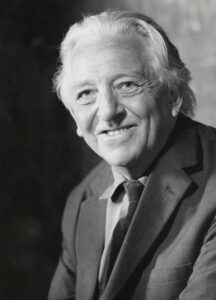
I don’t think it’s the novelist’s job to give answers. He’s only concerned with exposing the human situation… and I […]
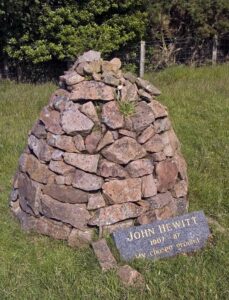
My chosen ground Inscription on the John Hewitt Cairn John Harold Hewitt (1907-1987) was the most significant Ulster poet to […]
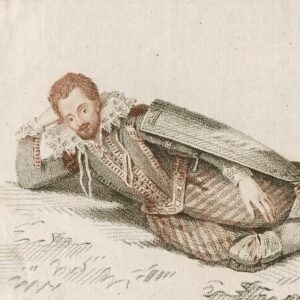
It is necessary to the happiness of man that he be mentally faithful to himself. Infidelity does not consist in […]